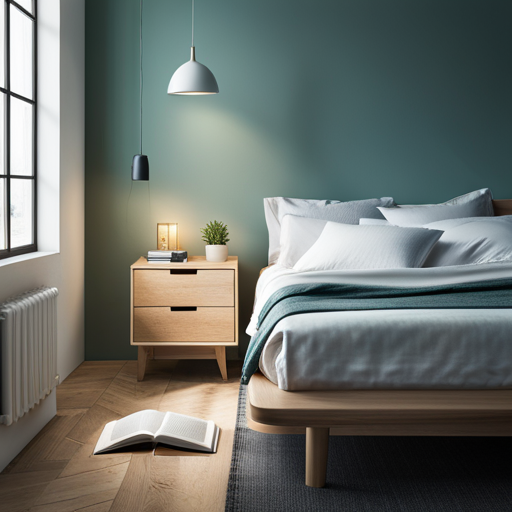"Cherishing Little Steps - A Haven for Baby and Family Journeys"
Screen-Free Bedtime Benefits
Are you tired of tossing and turning at night, struggling to fall asleep? Have you ever wondered if your screen time before bed is affecting your sleep quality?
Well, it’s time to put those bedtime screen habits to rest and experience the incredible benefits of a screen-free bedtime routine.
By disconnecting from your devices and embracing a screen-free environment before sleep, you can improve your sleep quality, promote relaxation, and reduce digital stimuli that may interfere with your rest.
Additionally, a screen-free bedtime allows your body to naturally produce more melatonin, regulate your circadian rhythm, and enhance your overall mood and emotional well-being.
So, why not give it a try? Say goodbye to screens and hello to a rejuvenating and restful night’s sleep.
Improved Sleep Quality

To improve your sleep quality, eliminate screens from your bedtime routine. Research has consistently shown that screen time before bed can negatively impact your sleep. The blue light emitted by screens, such as smartphones, tablets, and computers, can suppress the production of melatonin, a hormone that regulates sleep. This can make it harder for you to fall asleep and stay asleep throughout the night.
In addition to the effects of blue light, using screens before bed can also increase mental stimulation and make it more difficult for your brain to wind down and relax.
To optimize your sleep hygiene, it’s recommended to establish a screen-free period before bed. This means avoiding screens for at least an hour before you plan to sleep. Instead of scrolling through social media or watching TV shows, try engaging in relaxing activities such as reading a book, practicing meditation or deep breathing exercises, or taking a warm bath. By replacing screen time with these calming activities, you can create a more conducive environment for sleep.
Not only can eliminating screens from your bedtime routine improve your sleep quality, but it can also help increase your sleep duration. The stimulating effects of screens can delay the onset of sleep and reduce the overall amount of time you spend asleep. By establishing a screen-free period before bed, you give your body the opportunity to relax and prepare for sleep, leading to a longer and more restful night’s rest.
Enhanced Relaxation

As you eliminate screens from your bedtime routine, you can experience enhanced relaxation, which further contributes to improved sleep quality. Taking the time to wind down and relax before bed is essential for a restful night’s sleep. By incorporating stress reduction techniques into your bedtime routine, you can create an environment that promotes relaxation and prepares your mind and body for sleep.
One effective method for enhancing relaxation is to create a soothing bedtime routine. This routine can include activities such as reading a book, practicing deep breathing exercises, or taking a warm bath. These activities help to calm your mind and release tension from your body, allowing you to enter a state of relaxation more easily.
To help you visualize the importance of relaxation in your bedtime routine, here is a table showcasing stress reduction techniques that you can incorporate:
| Stress Reduction Techniques |
|---|
| Reading a book |
| Practicing deep breathing |
| Taking a warm bath |
| Listening to calming music |
Incorporating these techniques into your routine can help to reduce stress and promote a sense of relaxation before bed. By consciously dedicating time to unwind and relax, you can create a peaceful transition from wakefulness to sleep and ultimately improve the quality of your sleep. So, make it a priority to eliminate screens from your bedtime routine and focus on enhancing relaxation instead. Your mind and body will thank you for it.
Reduced Digital Stimuli

You can significantly reduce digital stimuli by minimizing screen time before bed. This practice, also known as a digital detox, can have numerous benefits for your bedtime routine. Here are three reasons why reducing digital stimuli is important:
-
Improved sleep quality: Research has shown that exposure to screens before bed can interfere with your sleep. The blue light emitted by screens suppresses the production of melatonin, a hormone that helps regulate sleep. By minimizing screen time, you can improve your sleep quality and wake up feeling more refreshed.
-
Reduced stress and anxiety: Constant exposure to screens can contribute to higher levels of stress and anxiety. The constant stream of information and notifications can overload your brain and make it difficult to relax. By disconnecting from screens before bed, you can create a more peaceful environment and give your mind a chance to unwind.
-
Enhanced productivity: Screen time before bed can disrupt your ability to wind down and can lead to a restless mind. By reducing digital stimuli, you can create a calmer atmosphere that promotes relaxation and allows you to be more productive during the day.
Incorporating a screen-free bedtime routine can have a positive impact on your overall well-being. So, consider putting away your devices at least an hour before bed and take the time to relax and recharge.
Increased Melatonin Production
Maximize your melatonin production by reducing screen time before bed.
Melatonin is a hormone that plays a crucial role in regulating your sleep-wake cycle. It’s often referred to as the ‘sleep hormone’ because it helps signal to your body that it’s time to sleep. By decreasing your exposure to screens in the evening, you can enhance the natural production of melatonin and improve your sleep quality.
Research has shown that exposure to the blue light emitted by screens, such as those from smartphones, tablets, and televisions, can suppress melatonin production. This can interfere with your body’s ability to fall asleep and stay asleep throughout the night. By limiting screen time in the hours leading up to bedtime, you allow your melatonin levels to rise naturally, promoting a more restful and rejuvenating sleep.
Reducing screen time before bed not only helps regulate melatonin production but also serves as a natural sleep aid. By creating a screen-free environment, you create a peaceful atmosphere that promotes relaxation and signals to your body that it’s time to wind down. This can help you fall asleep more easily and experience a deeper, more restorative sleep.
Incorporating screen-free activities before bed, such as reading a book, listening to calming music, or practicing relaxation techniques, can further enhance melatonin production and improve sleep quality. By prioritizing screen-free time in the evening, you prioritize your sleep health and overall well-being.
Better Circadian Rhythm Regulation

By reducing screen time before bed, you can improve your circadian rhythm regulation. Your circadian rhythm is your body’s internal clock that regulates your sleep-wake cycle. When your circadian rhythm is disrupted, it can lead to various sleep problems and negatively impact your overall well-being.
Here are some ways reducing screen time can benefit your circadian rhythm:
-
Improved Performance: Adequate sleep is essential for optimal cognitive function and performance. By reducing screen time before bed, you allow your body to naturally wind down and prepare for sleep, leading to better performance in daily activities.
-
Decreased Insomnia: Insomnia is a common sleep disorder characterized by difficulty falling asleep or staying asleep. Excessive screen time before bed can disrupt your body’s natural sleep signals and make it harder to fall asleep. By reducing screen time, you can improve your chances of falling asleep faster and experiencing a more restful night.
-
Regulated Sleep-Wake Cycle: Exposure to screens, especially those emitting blue light, can suppress the production of melatonin, a hormone that helps regulate sleep. By reducing screen time, you allow your body to produce adequate amounts of melatonin, helping to regulate your sleep-wake cycle and promoting better overall sleep quality.
Enhanced Mental Clarity

To enhance your mental clarity, prioritize reducing screen time before bed. Studies have shown that excessive screen exposure at night can have a negative impact on your mental focus and cognitive function. The blue light emitted by screens can interfere with the production of melatonin, a hormone that regulates sleep and wakefulness. When melatonin levels are disrupted, it can lead to difficulties falling asleep and lower quality sleep overall.
Additionally, engaging with screens before bed can overstimulate your brain and make it harder to relax and unwind. The constant stream of information and visual stimuli can keep your mind active and prevent it from entering a state of rest. This can result in racing thoughts, increased stress levels, and decreased mental clarity the next day.
By reducing screen time before bed, you allow your brain to gradually wind down and prepare for sleep. This can lead to improved sleep quality, which in turn enhances your mental focus and cognitive function during waking hours. Instead of scrolling through social media or watching television, consider engaging in relaxing activities such as reading a book, practicing mindfulness, or listening to calming music.
Improved Mood and Emotional Well-being

Reducing screen time before bed can positively impact your mood and emotional well-being. In today’s fast-paced world, it’s easy to feel overwhelmed and stressed. However, incorporating screen-free bedtime practices can help improve your overall mood and emotional well-being.
Here are three ways reducing screen time can benefit you:
-
Promotes positive psychology: Engaging in activities that promote positive emotions can have a significant impact on your mental well-being. By reducing screen time before bed, you create space to engage in activities such as reading a book, journaling, or practicing gratitude. These activities can boost positive emotions and create a more positive mindset.
-
Enhances self-care practices: Taking care of your emotional well-being is crucial for leading a fulfilling life. Spending time away from screens before bed allows you to focus on self-care practices like meditation, deep breathing exercises, or a relaxing bath. These practices can help you unwind, reduce stress, and improve your overall mood.
-
Improves sleep quality: Screens emit blue light, which can disrupt your sleep patterns and affect your mood. By reducing screen time before bed, you create a screen-free environment that promotes better sleep quality. Quality sleep is essential for emotional well-being and can improve your mood, reduce irritability, and enhance your overall mental health.
Incorporating screen-free practices before bed can have a profound impact on your mood and emotional well-being. Make it a priority to disconnect from screens and engage in activities that promote positive emotions and self-care. Your emotional well-being will thank you.
Reduced Risk of Sleep Disorders

Incorporating screen-free bedtime practices can also lead to a reduced risk of sleep disorders, ensuring a more restful and rejuvenating night’s sleep. Sleep disorders can have a significant impact on your overall well-being and quality of life. By prioritizing a screen-free bedtime routine, you can take proactive steps towards sleep disorder prevention and management.
Research has shown that the use of electronic screens before bed can disrupt your sleep-wake cycle and interfere with the production of melatonin, the hormone responsible for regulating sleep. By avoiding screens in the hours leading up to bedtime, you can help your body naturally wind down and prepare for sleep. This can greatly reduce the risk of developing sleep disorders such as insomnia or sleep apnea.
Additionally, screen-free bedtime practices promote a healthier sleep environment. The blue light emitted by screens can trick your brain into thinking it’s daytime, making it harder to fall asleep and stay asleep. By creating a screen-free zone in your bedroom, you can create a calm and relaxing space that’s conducive to a good night’s sleep.
Incorporating screen-free activities before bed, such as reading a book, practicing relaxation techniques, or engaging in a calming hobby, can further support sleep disorder prevention and management. These activities help to promote a sense of relaxation and reduce stress, which are essential for a good night’s sleep.
Enhanced Productivity and Focus

Practicing screen-free bedtime routines can significantly boost your productivity and focus. By minimizing screen time before bed, you create the conditions for improved cognitive function and mental clarity.
Here are three ways in which a screen-free bedtime routine can enhance your productivity and focus:
-
Increased creativity: When you disconnect from screens before bed, you allow your mind to wander and explore new ideas. This can lead to increased creativity and innovative thinking, which can be beneficial in various aspects of your life, such as problem-solving at work or coming up with new ideas for personal projects.
-
Improved time management: Engaging in screen-free activities before bed helps you develop better time management skills. Instead of mindlessly scrolling through social media or watching television shows, you can use this time to plan your schedule, prioritize tasks, and set goals for the next day. This proactive approach to time management can enhance your productivity and allow you to make the most of your time.
-
Enhanced focus: Screens emit blue light, which can interfere with your sleep patterns and disrupt your ability to focus the next day. By avoiding screens before bed, you give your brain a chance to relax and recharge, leading to improved focus and concentration during the day. This can result in increased productivity and efficiency in your work and personal life.
Incorporating a screen-free bedtime routine into your daily habits can have a profound impact on your productivity and focus. By nurturing your creativity, improving your time management skills, and enhancing your focus, you set yourself up for success in all areas of your life.
Overall Health Benefits

Taking a break from screens before bed has numerous health benefits. Not only does it enhance your productivity and focus, but it also has a positive impact on your overall health.
One of the benefits of screen-free bedtime is increased creativity. When you disconnect from screens, your mind is free to wander and explore new ideas. This can lead to increased creativity, allowing you to think outside the box and come up with innovative solutions to problems.
Another health benefit of screen-free bedtime is a boosted immune system. Research has shown that the blue light emitted by screens can disrupt your sleep patterns and suppress the production of melatonin, a hormone that plays a crucial role in regulating your immune system. By avoiding screens before bed, you give your body the opportunity to produce adequate melatonin, which in turn strengthens your immune system and helps protect you against illnesses.
Incorporating screen-free time before bed not only improves your creativity but also strengthens your immune system, leading to better overall health. So, make it a habit to disconnect from screens at least an hour before bed and engage in activities that promote relaxation and restful sleep. Your mind and body will thank you for it.
Frequently Asked Questions
Can Using Screens Before Bedtime Really Affect My Sleep Quality?
Using screens before bedtime can negatively impact your sleep quality due to the effects of blue light. Establishing a bedtime routine that doesn’t involve screens can help improve your sleep and promote a healthier lifestyle.
How Does Reducing Digital Stimuli Before Bed Help With Relaxation?
Reducing digital stimuli before bed helps you relax by improving sleep quality. It reduces exposure to blue light, which can disrupt melatonin production. So, put away those screens and enjoy a better night’s sleep!
What Is Melatonin and How Does It Affect My Sleep?
Melatonin is a hormone that regulates your sleep-wake cycle. Blue light from screens can suppress melatonin production, affecting your circadian rhythms. Understanding melatonin’s role is crucial for optimizing your sleep.
Can Using Screens Before Bed Lead to Sleep Disorders?
Using screens before bed can lead to sleep disorders and negatively impact your sleep quality. Research shows that the blue light emitted by screens can interfere with melatonin production, making it harder for you to fall asleep and stay asleep.
How Does Reducing Screen Time at Night Affect My Overall Health?
Reducing screen time at night improves your overall health. It enhances sleep quality, boosts mental and physical health, enhances cognitive function, and increases productivity. Make it a habit for a healthier you!
Conclusion
In conclusion, incorporating screen-free bedtime habits can have numerous benefits for your sleep and overall well-being.
Did you know that a study found that individuals who used electronic devices before bed took longer to fall asleep and experienced less overall sleep time?
By disconnecting from screens, you can improve sleep quality, enhance relaxation, and reduce the risk of sleep disorders.
So, make it a habit to unplug and unwind before bedtime for a better night’s sleep and a healthier lifestyle.


